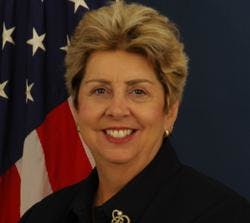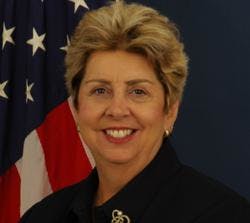Darling to stay on as FMCSA boss: What difference does it make? (Part 1)
It’s officially unofficial. Through some bureaucratic sleight of hand, Scott Darling—named acting administrator last August—will stay on at the top of the Federal Motor Carrier Safety Administration's organizational chart. He just won’t be the Administrator.
Should the trucking industry care or, rather, what difference will it make?
First, here’s the fully vetted language the DOT came up with in its declaration of support for Darling:
Secretary Foxx has delegated Scott Darling, the Chief Counsel of FMCSA, the responsibility for performing the duties of the FMCSA Administrator. Thus, consistent with the Vacancies Act, he will continue to perform the duties of the Administrator but will no longer be referred to as the Acting Administrator.
“Consistent with the Vacancies Act” is high praise, indeed.
But somebody has to tell everybody else to keep rowing, officially. That’s the way management, particularly in a bureaucracy, works. Does it make any difference to the regulatory agency’s worker bees whether they’re taking orders from someone who’s been formally appointed, duly grilled and approved by a know-nothing Senate, compared to another high-level political appointee who didn’t have to go through the confirmation process?
Maybe, maybe not. In response to Senate criticism of the Obama administration for dragging its feet on filling key DOT vacancies, Transportation Secretary Anthony Foxx defended the abilities of the acting agency heads.
“We have good leaders in place, even if they’re ‘acting.’ The expectation is that there’s no drop off in our ability to focus,” Foxx said. “We do want to make sure we get the right fit for these jobs. It’s more than just trying to find somebody off the street. I do believe that, both with the folks we have in acting roles as well as any that may or not be moving through the process right now, we will keep our standards very high.”
To get some perspective on the matter, I exchanged a few emails with a long-time DOT insider over the following couple of weeks—and it turns out her crystal ball is very accurate.
Rose McMurray, whose public service career included several leadership posts at FMCSA, retired as chief safety officer in 2011 after having overseen the implementation of the Compliance, Safety, Accountability program, then known as CSA2010.
She also did a stint as the de facto agency head, taking over between the departure of John Hill in January 2009 and the appointment of Anne Ferro that November.
In the early days of any administration, many of the top jobs at the DOT agencies are held by career civil servants pending the nomination and confirmation of political appointees. McMurray’s stint was longer than most because Ferro’s nomination was somewhat controversial: Safety groups judged her to be a friend of the trucking industry, and were concerned those ties would mean an industry-friendly approach to regulation. Heh.
And in explaining the ins and outs of managing a federal bureaucracy, McMurray emphasizes the distinction between career staff, such as herself, and the political appointees, such as Darling, who come and go from several high-ranking slots at DOT agencies besides administrator.
Essentially, as I understand it, the career folks know how to keep the ship afloat while the political staff sets the course according to an administration’s policy goals. Because politics is “the art of the possible,” agency leadership needs to be a balance of experience and vision. And the bureaucracy works well when the top career staff have some political savvy to go along with management expertise and the political appointees actually know what they’re doing, or at least come in with the mindset that they are willing to learn how the agency operates before tackling substantial administration policy goals.
“Basically, I wanted us to be judged as a sound and effective agency that did not need close Secretarial monitoring and oversight,” McMurray said of her leading FMCSA. “There is a general suspicion that the career staff are wedded to the prior Administration's policies and will thwart the new policies. It is important to provide facts to the new folks without being unalterably committed to the past.”
Of course, one has to be careful, she pointed out.
“Career staff who argued too vigorously often found themselves replaced by a temporary political appointee who led an agency until the Administrator was confirmed,” McMurray said.
Since Darling is already “in the club” as a trusted political appointee, she expected him to be asked to stay on.
But FMCSA has drifted off course, McMurray suggests, because of a leadership imbalance. Let's continue that discussion, along with a look at the difficulties of finding someone for a no-win job, in a second post here.
About the Author
Kevin Jones
Editor
Kevin has served as editor-in-chief of Trailer/Body Builders magazine since 2017—just the third editor in the magazine’s 60 years. He is also editorial director for Endeavor Business Media’s Commercial Vehicle group, which includes FleetOwner, Bulk Transporter, Refrigerated Transporter, American Trucker, and Fleet Maintenance magazines and websites.
Working from Beaufort, S.C., Kevin has covered trucking and manufacturing for nearly 20 years. His writing and commentary about the trucking industry and, previously, business and government, has been recognized with numerous state, regional, and national journalism awards.


